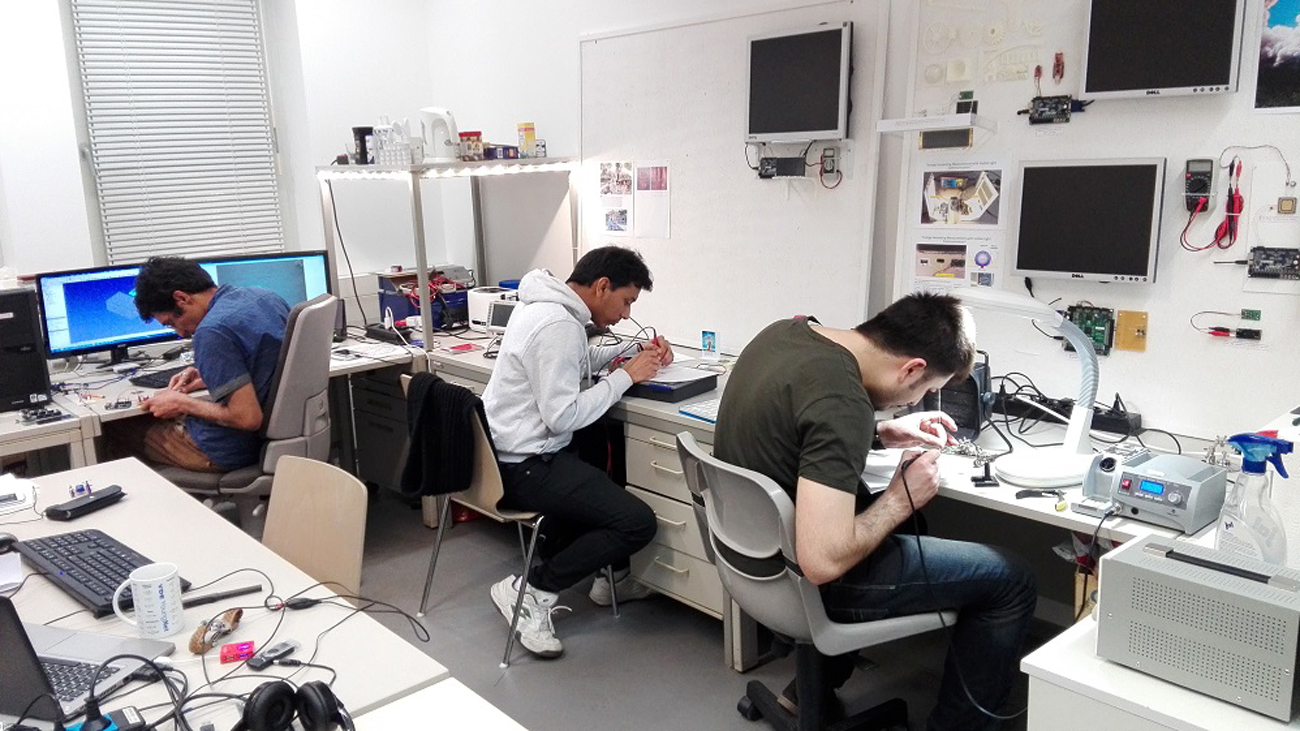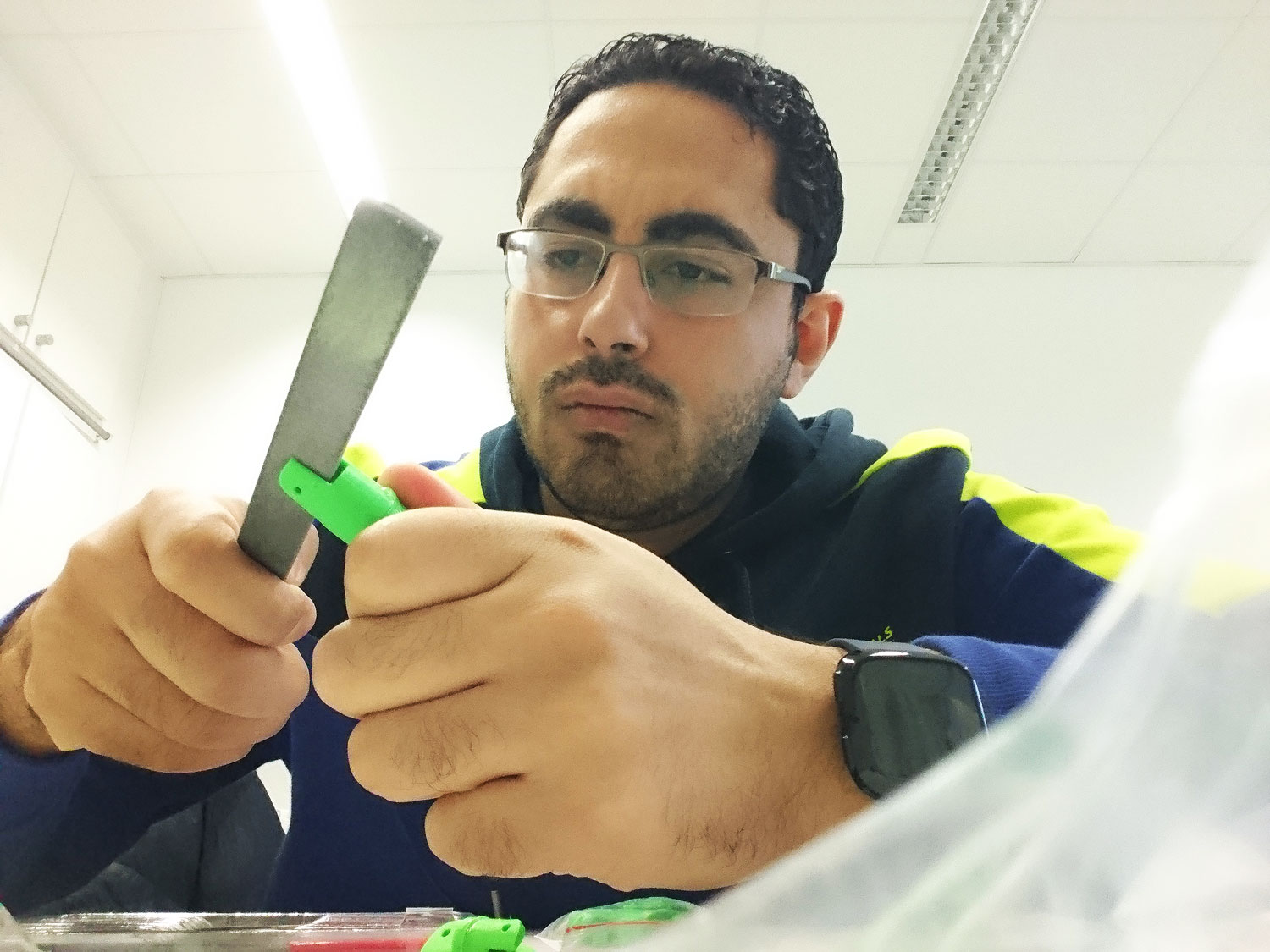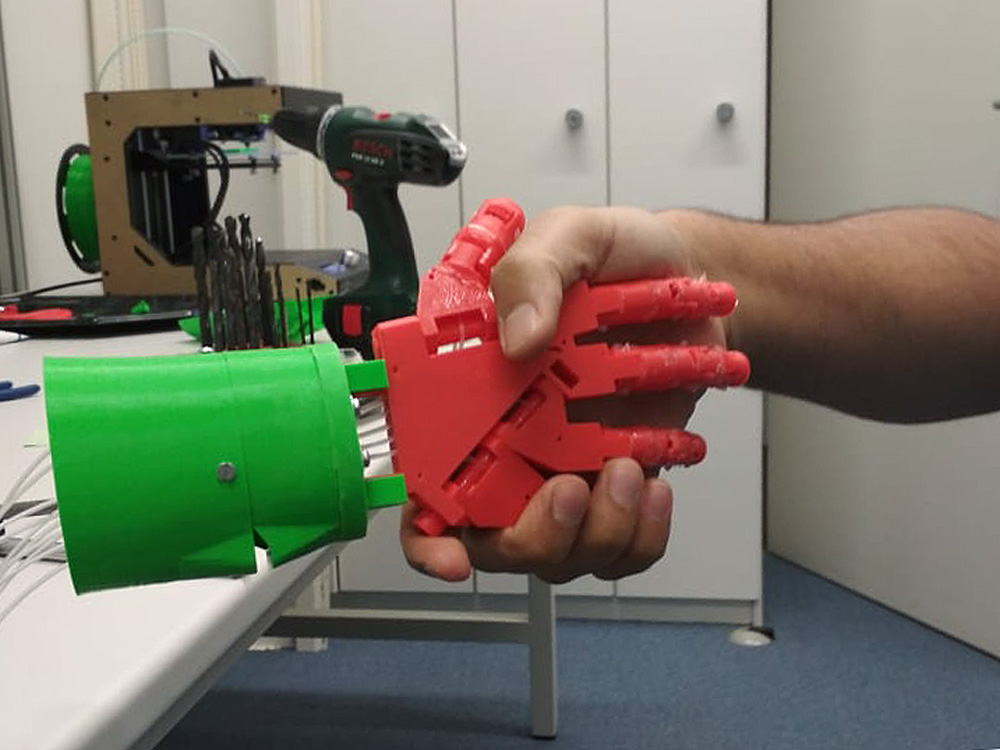
© Bremen Dynamics
“We See Ourselves as Motivators for Forward-Looking Ideas”
Bremen Dynamics supports students with the realization of their start-up ideas
An unusual laboratory is hidden behind this door in the NW1 Building: In the so-called “Start-Up Lab”, ideas are supported with technical means, as well as business and research contacts. The non-profit organization Bremen Dynamics helps students to turn their theoretical projects into applicable business ideas. They work closely together with the Institute of Electrodynamics and Microelectronics (ITEM). Ahmed Mekky is one of the students profiting from the charitable work of Bremen Dynamics. Ahmed and the scientific assistant Amir Najafi tell us how exactly this support works.
The 3D printer carefully places the synthetic strands on top of each other. Ahmed Mekky files the created green and red parts so that they perfectly fit together later. When the pieces are put together, the individual parts create an arm made up of red fingers, a wrist, and a green lower arm. Then the electronics come into play – coils and wires run through the lower arm like tendons. In the end, a robotic arm, which is to later be controlled by artificial intelligence (AI), is created. Mekky’s idea has many application possibilities: “The arm can be used in a medical setting but is especially of value for processes that are too monotonous for humans or those that cannot be carried out in acceptable conditions.” With regard to the robotic arm, the master’s student from the University of Bremen has the idea of it being used at a waste sorting plant in developing countries, which will be powered by solar power. It would be an enormous load off the backs of the people who currently have to pick the waste by hand. However, the bionic arm – thus an arm that is based on a human arm – only forms half of the project. The student of Control, Microsystems, Microelectronics is offering instructions on how to build the robotic arm online: “In this way everyone on the planet can build the arm at little expense.”

© Bremen Dynamics
One of the people supervising Mekky’s project is Amir Najafi. He is a PhD student and scientific assistant at the Institute of Electrodynamics and Microelectronics (ITEM) at the University of Bremen. Additionally, he works at the non-profit organization Bremen Dynamics. The organization helps students to turn their theoretical projects into applicable business ideas. Najafi explains that ITEM and Bremen Dynamics work together closely in supporting students: “The scientific projects and theses are supervised by the institute – by myself and Professor Alberto Garcia-Ortiz. If the students then wish to further develop their ideas into a start-up, Bremen Dynamics helps.”
The vision: Motivating students to realize their ideas in Bremen and the surrounding region
One of the founders of Bremen Dynamics is Hendra Kesuma. He was a scientific assistant at ITEM who went on to work in the free economy. The vision of Bremen Dynamics: Motivate students to realize their ideas in Bremen and the surrounding region. “We still observe that many well-educated people with interesting ideas go to South Germany and then either work for companies or establish start-ups there instead of doing the same in Bremen,” explains Najafi. This is mainly a loss for Bremen State and the university, which is training people well. “We see ourselves as motivators for forward-looking ideas.” It is in this way that Najafi describes the NGO.

© Bremen Dynamics
Bremen Dynamics provides students with access to the necessary means, such as a 3D printer, cameras for AI, as well as materials to produce a prototype. Kesuma also helps with the creation of a business concept and the search for potential sponsors and supporters. Some of them may be companies but there are also scientific institutes and institutions, explains Najafi. Alongside Mekky’s bionic arm, the idea of an ultrasound detector to help blind people with their orientation is for example being supported by Bremen Dynamics. The organization makes no money with the projects. The majority of the technical equipment that is made available to students by Bremen Dynamics was funded by Kesuma himself.
It quickly became clear to Mekky that all was not over with the completion of the master’s thesis. He wants to take the plunge into self-employment with his idea and is looking forward to receiving the organization’s support: “As well as the specialist communication and technical means, Bremen Dynamics has provided me with support regarding how I can optimally plan and design the prototypes. That is helping me to become self-employed with my idea after my degree.”